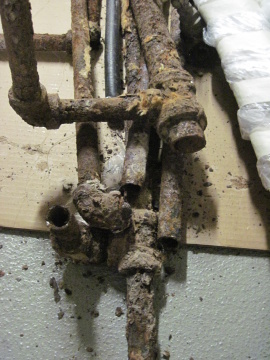Detect Heating & Cooling Pipe Problems Before They Boil Over.
As buildings mature, their heating and cooling piping systems age as well. Often referred to as closed-loop hydronic HVAC systems, these systems employ boilers and chillers to heat (or cool) water that then flows through pipes to fan coil units (FCUs). The FCU’s blow air across the hot (or cold) coil to heat and cool the air in an apartment or condominium.Symptoms of A Failing HVAC System
To improve efficiency, these systems use insulation around the heating and cooling pipes to minimize ambient temperature loss as the water travels through the property to the units. As these closed-loop hydronic systems age, the insulation on the main loops, the risers and the runouts that feed the individual units within your property can deteriorate.

For properties in climates with warmer temperatures, condensation often forms on the outside of these pipes during the summer months. This condensation is caused from temperature differences between the ambient air temperature (warmer) and the water temperature inside the pipe (colder). The insulation on these pipes helps protect against condensation, but over time, the moisture from the condensation causes the insulation to deteriorate and eventually fail, corroding the pipes from the exterior.
As the insulation fails, moisture levels increase in the pipe chase as a result of the continued condensation from system use, causing the eventual buildup of mold and mildew behind the walls. Because this is all typically hidden within a property’s structure, it’s not uncommon to find hydronic pipe literally crumbling apart inside a building’s walls without anyone being aware. Frequently, the first sign of a problem is a leak that occurs when a pipe has already failed completely, prompting an emergency shut down of the building and loss of air conditioning until the pipe can be replaced.
The Costs of a Failing System
In addition to moisture and leak issues, as the insulation fails, the heating and cooling system loses efficiency. The system’s mechanical components (boilers, chillers, pumps, and fan coil units) work harder to heat and cool the property, placing greater strain on the system’s more expensive components and shortening their life span. This inefficiency directly correlates to higher energy costs to heat and cool the property, costing owners more to run the building as the system ages and deteriorates.
Planning for HVAC System Replacement
Unfortunately, since the pipes corrode from the outside in, there is no solution except to replace these pipes when they start to fail. Heating and cooling system repipes can require a significant capital expense, so planning ahead for these projects is critical. For apartment complexes, this means understanding the scope and magnitude of the problem and budgeting accurately. For condominiums, co-ops, and other shared ownership structures, it means conducting reserve studies, securing financial reserves, and reallocating other investments to complete the repipe before it becomes even more expensive.
It’s worth inspecting your heating and cooling system regularly to detect any signs of aging and catch any potential problems early on. You don’t have to have catastrophic leaks to feel a significant impact from an aging heating and cooling system.

